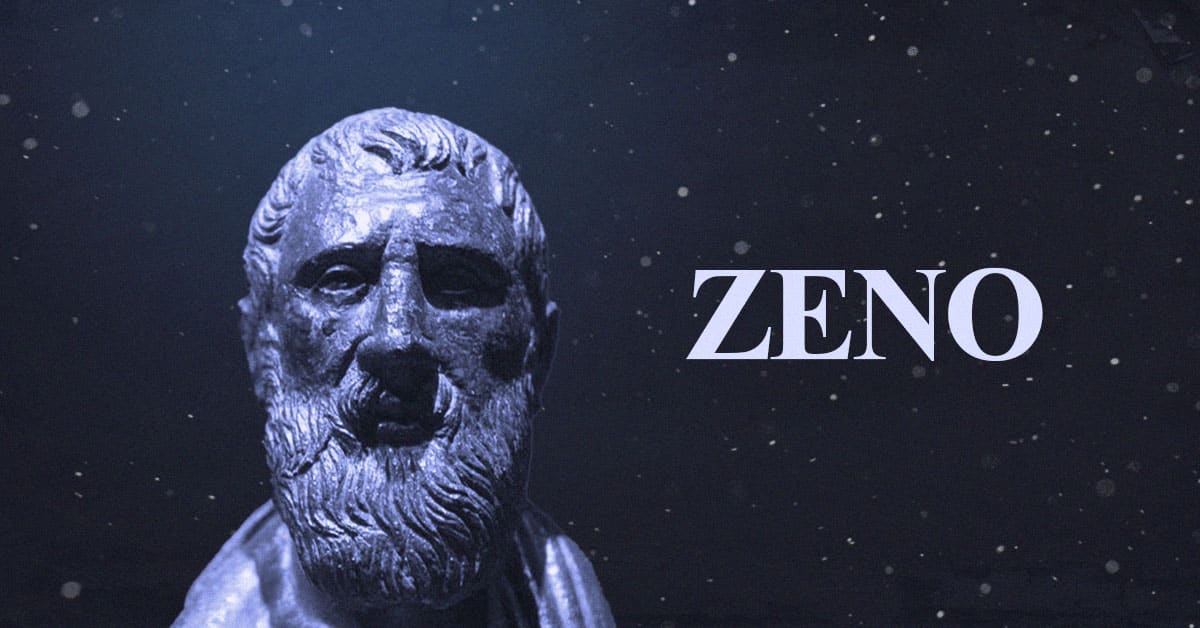
If you’ve found any value in the ideas of modern Stoicism, you have Zeno of Citium to thank. Zeno, the founder of the Stoic school of philosophy, was a Hellenistic philosopher from Cyprus. Borrowing ideas from the Cynics, Zeno believed that man could enjoy peace of mind if only he lived in accordance with nature.
The ideas of Zeno became very popular within his own lifetime, and Stoicism continued to be one of the major schools of philosophy all the way through to the Roman era. These ideas also experienced a revival during the Renaissance as well as in the current day.
Zeno of Citium lived a simple, ascetic life even though he was a wealthy merchant. Just like the Stoic philosophers who came to follow him, Zeno was concerned with achieving the goal of eudaimonia (good spirit or happiness) through living a life in accordance with nature.
While none of the original writings of Zeno have survived except for incomplete pieces that later writers managed to preserve, though it’s unfortunate that we cannot dive into Zeno’s writing, the best quotes from the Stoic philosopher can help us understand the origins of Stoicism and how its ideas might be applicable to our modern lives.
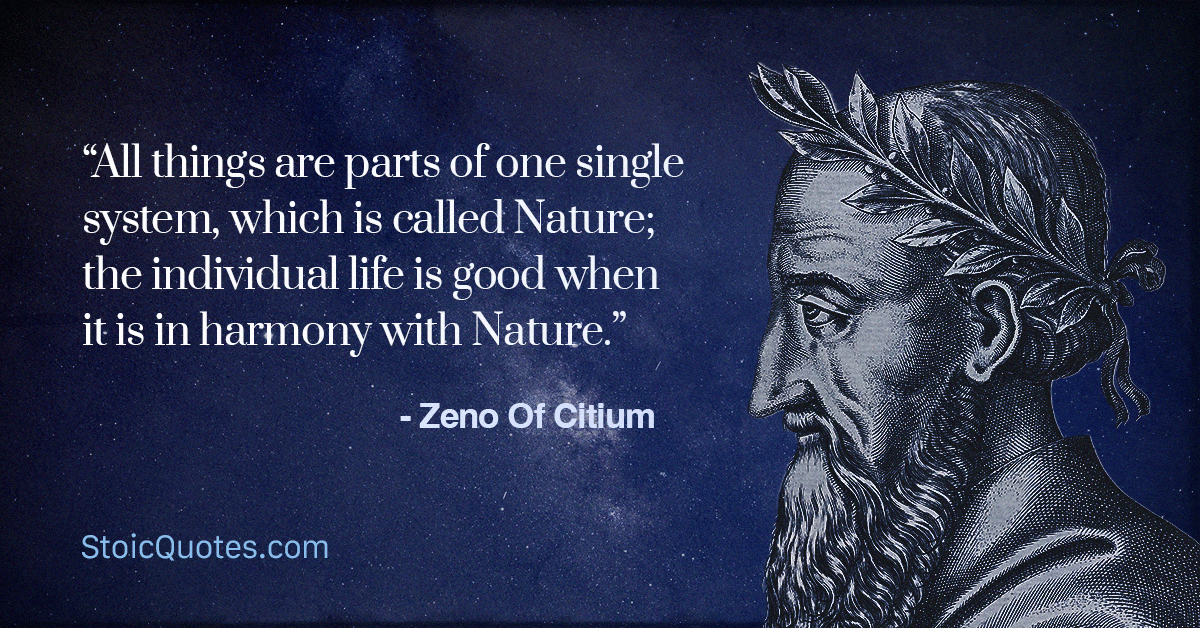
One thing you’ll notice right away when you start studying this philosophy is that Stoics are constantly talking about Nature with a capital ‘N.’ It’s worth understanding that by Nature, they are referring to the entire external universe, which is composed of both material substance and incorporeal matter. Nature is a word that encompasses all beings and all things, and the Stoics identified the idea of nature with the universe or the cosmos.
In Stoic philosophy, nature and the entire universe are divine in essence. As Nature is both holy and sacred within this view, the only way for humans to attain eudaimonia is if they live in accordance with nature.
All things are parts of one single system, which is called Nature; the individual life is good when it is in harmony with Nature.
-Zeno of Citium
In Zeno’s view, the universe is a divine reasoning entity, with all of the parts composing the whole. In order to build his concept of the universe, he borrowed ideas from the physics of Heraclitus. In this worldview, there is a divine artisan fire that produces everything and extends throughout the universe.
Another word that can be used to describe this divine fire is aether. All activity in the universe springs from this energy, which allows otherwise passive matter to participate in the happenings of Nature. Zeno believed (as did Heraclitus before him) that there is a cyclical nature to the universe, oscillating between formation and destruction.
Nature is a force that works to accomplish what is right while actively working against what is wrong. Though Fate is a concept identified with Nature in this philosophy, free will is also attributed to it.
This quote is a wonderfully simple summary of Zeno’s view of Nature and the universe in this regard. Everything that exists is a part of a greater, single whole known as Nature. In order to live your own individual life in a good way, you must act in a way that is harmonious with this system.
A bad feeling is a commotion of the mind repugnant to reason, and against nature.
-Zeno of Citium
We all have to deal with bad feelings sometimes– whether it be anxiety, anger, sadness, or some other unpleasant storm brewing inside us. Here, Zeno argues that your bad feelings are evidence that your mind is in turmoil because of something that is both against nature and unacceptable within the bounds of reason.
This quote states that bad feelings indicate that we are out of sync with the flow of nature. This brings up interesting ideas, as our modern mentality is so quick to blame our unpleasant feelings on other forces, whether it be the chemistry of our brain or the less-than-fortunate circumstances of our birth. However, here, Zeno points to the fact that you can change to be more in accordance with nature and, therefore, rid yourself of unpleasant feelings at the same time.
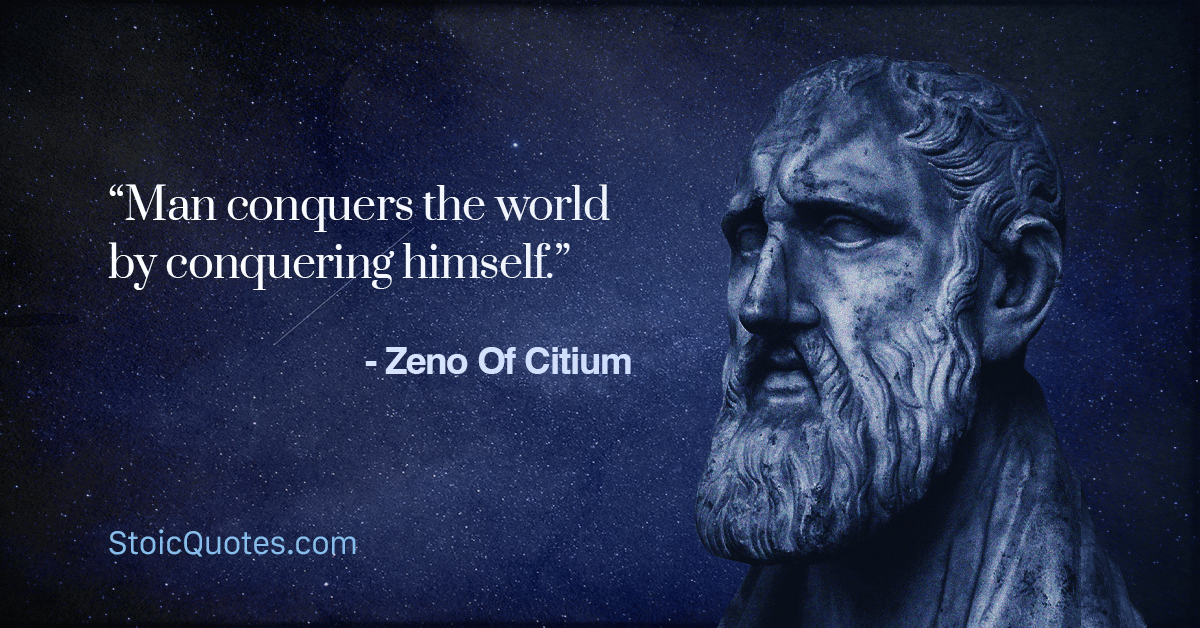
When a modern mind first encounters the world of Stoicism, their relationship with death might be one of the most striking aspects of the philosophy. Western society seems to have a deep fear of or aversion to death. If you don’t believe that, try bringing up the topic with sincerity at a party or lunch meeting and see how quickly the temperature of the room cools.
What if we could change the way that we see death, though? What if we could understand it as a necessary type of occurrence within the greater system of Nature rather than some personal annihilation?
No evil is honorable; but death is honorable; therefore death is not evil.
-Zeno of Citium
In this quote, you can see a perfect example of how Zeno applied his concept of living in accordance with nature as virtuous. You can also see how he applied the logic of rationality to interpret death.
Here he states that there is no such thing as an honorable evil, and death is understood by man as honorable. This means that death in itself is not evil and shouldn’t be viewed as such. If we zoom out on our lives and understand that death is a natural occurrence, we can cease to view it as something to fear and avoid at all costs.
I made a prosperous voyage when I was shipwrecked.
-Zeno of Citium
This isn’t exclusively a metaphor but is instead a comment on an event that really happened to Zeno of Citium. However, in his recollection of how his life unfurled, we can find a beautiful notion that can be applied to many experiences in life.
The life of Zeno is quite an interesting one, and through his story, we can get an exquisite glimpse of the way that Nature and fate can play themselves out in the life of one man.
Born in Citium in Cyprus, only a little bit is known of the life of Zeno. It is known, though, that he went to the oracle of Delphi to ask what he needed to do to “attain the best life.” The answer was that he should “take on the complexion of the dead.”
Zeno was able to translate this cryptic message to mean that he should study ancient authors. He was already a wealthy merchant when he survived a shipwreck between Phoenicia and Peiraeus, which changed the course of his life forever.
After living through the shipwreck, Zeno visited a bookseller in Athens. It was here that he came across Memorabilia by Xenophon, which left him with the desire to meet men like Socrates. At the same time, he was asking the bookseller where he could find such men. The most famous Cynic who lived in Greece at the time happened to walk by a man named Crates of Thebes. The bookseller pointed right to him, Zeno studied under him, and the rest is history.
This whole story is summed up nicely in the above quote. How could a shipwreck be profitable? Well, it can be when you go with the flow of life and sync yourself with Nature’s rhythm. Were it not for the shipwreck, Stoicism would likely never have existed, let alone exacted the influence it has had over the world.
In your own life, have you ever had an experience where you felt amazed at how many things had to come together for one event to occur? Maybe it’s the way you met your wife, a series of strange synchronicities, or a major, life-changing event that seems to belong more in a movie than in your own autobiography.
Perhaps you have even had what many would consider a profoundly negative experience that ended up changing your life for the better. Sometimes, painful, difficult experiences can be the exact catalyst we need to become the people we want to be.
Sometimes the things that happen to us feel random, unexplainable, or unreasonably cruel. But it’s worth considering that they are all perfectly rational within the mechanisms of Nature and that our next shipwreck actually might turn out to be an incredibly profitable endeavor indeed.
When a dog is tied to a cart, if it wants to follow, it is pulled and follows, making its spontaneous act coincide with necessity. But if the dog does not follow, it will be compelled in any case. So it is with men too: even if they don’t want to, they will be compelled to follow what is destined.
-Zeno of Citium
This Zeno quote helps to understand the seemingly complex relationship between Fate and free will. Philosophers have been arguing back and forth about these notions for millennia, and here, Zeno offers his two cents.
He posits that there is such a thing as destiny, but we can choose whether or not we go along with it willingly. We can act in a way so that our actions coincide with the unfurling of fate, or we can get pulled along by it as we try to meet other ends fruitlessly. In this image, you can see how working to live in accordance with Nature’s laws could certainly create a less stressful, happier, and more peaceful life than fighting them at every turn.
Man conquers the world by conquering himself.
-Zeno of Citium
This beautiful, brief quote sums up one of the major tenets of Stoic philosophy quite succinctly.
After all, let’s say that you have a goal, such as running for political office, retiring early and achieving financial freedom, or starting a business. These are all attainable things, as evidenced by the numerous people who have met these goals in modern times and throughout history. However, if you haven’t conquered yourself, you will likely find that your inadequacies and faults will sabotage you on the way to greatness.
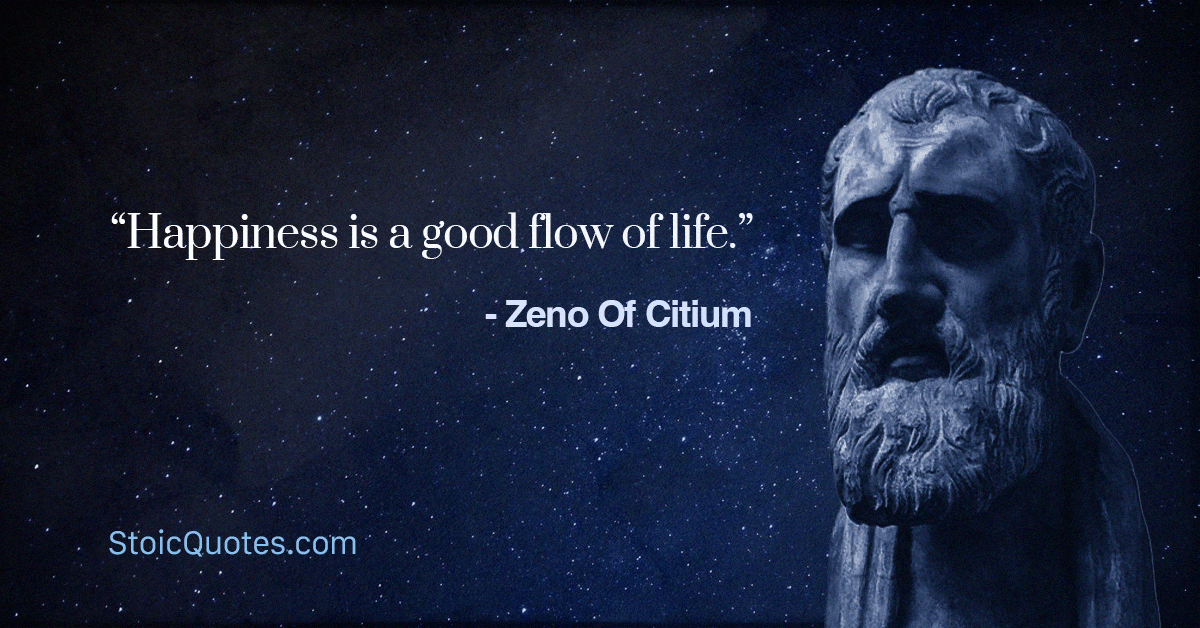
When you look at the Stoic view of what happiness is, you can find that they are much in agreeance about how to achieve this slippery state of mind. Happiness has been suggested to be “living in agreement with nature.” The idea here is that in order to be happy, you must live a virtuous life, as well as the notion that leading a virtuous life is sufficient for achieving happiness.
What do the Stoics mean by virtue, though? Some of the states emphasized by Stoics as being virtuous include honesty, justice, simplicity, moderation, resolve, courage, fortitude, and self-discipline.
Happiness is a good flow of life. -Zeno of Citium
Here, Zeno answers the long-asked question, “What is happiness?”
According to a study conducted by NORC at the University of Chicago, American adults were more unhappy in 2020 than they had been in almost half a century. In the study, only 14% of adults said that they were “very happy,” which had plummeted from 31% back in 2018. Of course, one can easily attribute the big drop here to the outbreak of the COVID-19 pandemic as well as the lockdowns that accompanied it, which kept people isolated and created a lot of economic stress.
That being said, one could argue that this study points to a reality that most Americans are not guided by the beliefs of Stoic philosophy. If you check out the ideas of Epictetus, for example, you find a wealth of information about discerning the difference between what is and isn’t in your control, and how to approach life knowing this information.
One might imagine that if Epictetus lived through the pandemic, he would not have let world events impact his pursuit of eudaimonia. This is evidenced by what we know of his own life, having grown up in slavery only to become one of the most famous Stoic philosophers of all time.
In this Zeno quote, we get an idea of what is meant by eudaimonia or happiness. Here, happiness is not something that is bought or acquired, nor something that you expect to gain down the road. Happiness is, instead, woven right into the fabric of time, and exercising a good flow of life according to the laws of nature isn’t just how you acquire happiness but, instead, happiness itself.
It is in virtue that happiness consists, for virtue is the state of mind which tends to make the whole of life harmonious.
-Zeno of Citium
Within the philosophy of Stoicism, Nature is understood to be rational. The law of reason governs the universe. While humans are unable to escape this force, they do have the ability to deliberately follow the law of reason.
In Stoic philosophy, a virtuous life is one that is led according to a rational nature. Zeno states in this quote that you can find happiness in living a virtuous life. Because acting virtuously is synonymous with living in harmony with nature, it means that happiness is, by definition, found through a virtuous state of mind.
When we think of living a Stoic life, it’s easy to think about it as a wholly individualistic endeavor. However, an important aspect of living in accordance with Nature is how you treat others and the people you surround yourself with.
All the good are friends of one another.
-Zeno of Citium
There is something so beautiful, simple, and deep about this Zeno quote. In these words, you can see how seriously he took the picture of the universe as a complete system of which every existing thing is a mere part. From this standpoint, all good people are an interconnected team that works together and with Nature to create the world we live in today.
Whether you are a person who has too many friends or too few, it’s worth considering the implications of this quote on your social circle. It’s easy to look for friends who have the same interests, taste in music, or political views.
What if you instead sought to surround yourself with other people you genuinely believed to be good? What if being around good people could help you improve yourself, and together, you could help to create positive change in your community, your country, or the world? Rather than judging people based on their adopted identity characteristics, consider seeking out people who are similarly concerned with leading a virtuous life and the peace of mind that comes with it.
No one entrusts a secret to a drunken man; but one will entrust a secret to a good man; therefore, the good man will not get drunk.
-Zeno of Citium
The second most common form of substance abuse in the U.S. is alcohol abuse, second only to tobacco. While many other drugs are stigmatized in our society, alcohol is one that, for whatever reason, is largely culturally accepted. This means that the line between being a moderate social drinker and having a problem can be much blurrier than with other drugs.
People who are interested in Stoicism in this day and age can find in the philosophy arguments for moderation that are sorely needed in a society that is pretty hedonistic. Anyone who has ever tried to quit drinking or abstaining from some other popular drug has likely found that the people around you can push back when you try to change yourself for the better. One might be surprised to find that, not only are your buddies not supportive of your choice to quit drinking, but they actively try to undermine your efforts.
In this quote, Zeno uses his straightforward rational thinking to argue against drunkenness in a way that is very easy to understand. If you’re interested in Stoicism, there’s a good chance you are trying to make yourself a better person– a good man. Here, Zeno expresses the simple logic that good men are trustworthy, drunk men are not trustworthy, and therefore, to be a good man, you must not drink to excess.
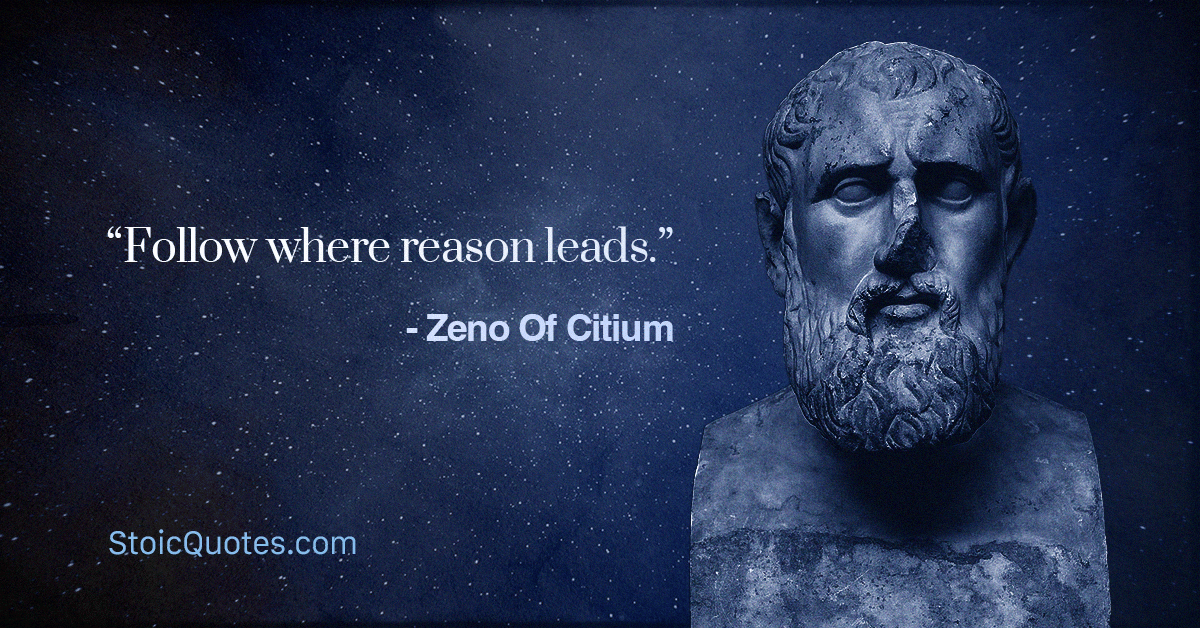
As we have learned so far, living a virtuous life is the path to happiness, according to the Stoics. Let’s see what the founder of Stoicism has to say about living in accordance with the virtues of nature.
No matter whether you claim a slave by purchase or capture, the title is bad. They who claim to own their fellow-men, look down into the pit and forget the justice that should rule the world.
-Zeno of Citium
In this quote, Zeno makes his stance on slavery quite clear. While being anti-slavery might not be a radical position in the 21st century, it’s important to remember how common and pervasive slavery was in the ancient world.
Zeno has made it clear in the quotes that remain of his writings that one must live in accordance with nature in order to live a virtuous life. Here, he expresses that “justice” is one of the laws of reason that rules the world, and in owning another man, the slave owner is actively acting against nature.
This quote can also help us understand how our individual actions relate to the larger world as a holistic system. If you take this logic and apply it to much more mundane vices than owning slaves, you can see how living a virtuous life helps to keep you flowing with, not against, the stream of nature. It’s easy to excuse less-than-virtuous actions in a one-off way, but even in the smallest action, you are either working with or against the natural law.
Follow where reason leads.
-Zeno of Citium
It’s easy in this life to be led by our emotions, but this doesn’t always take us to a place we want to go. Zeno argues that we should, instead, be led by reason. This is the path that will take us to a virtuous life as well as happiness.
For more thought-provoking words about leading a good life, check out the best quotes of Marcus Aurelius.
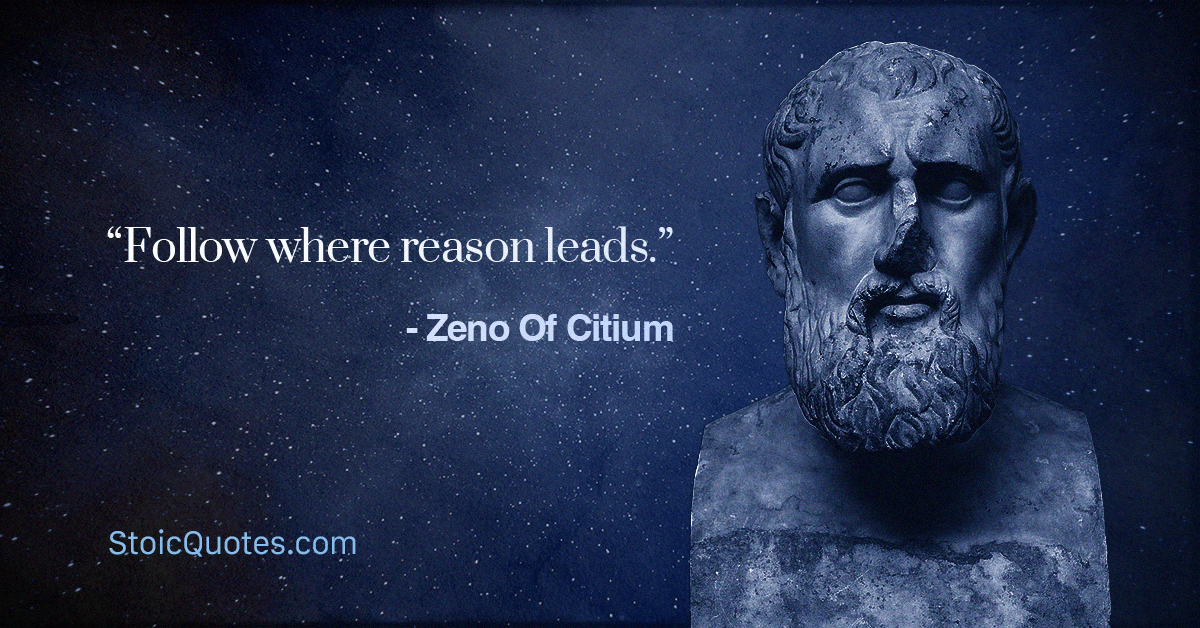
You can describe modern Western culture as many things, but quiet and contemplative aren’t really words that come to mind. Zeno offers some sound advice that seems particularly applicable to the contemporary human in this regard. If you aim to lead a virtuous life, you will need to be aware of just how powerful words are and the way that words are not something that should be used lightly.
We have two ears and one mouth, so we should listen more than we say.
-Zeno of Citium
What could our modern society be like if people actually followed this notion presented by Zeno? While it might seem silly to determine your ratio of listening to speaking solely based on the number of sense organs you have for each purpose, there’s something so simple and beautiful about this idea.
In this quote, it becomes clear that the ancient world might not have been as different from our own as we imagine. All the way back in 300 B.C., man was still man, and he was all too likely to speak without thinking, all while forgetting to listen.
If you are trying to better yourself, consider being more thoughtful before you speak. Work on listening to others, really listening to others. It’s all too common that instead of listening to the person speaking, we are caught up in our own heads trying to come up with something witty or intelligent to say when it becomes our turn to speak again.
How many times have you been a part of a conversation, only to realize that neither of you is really talking to each other? How much could our society benefit from individuals working to listen to others and think before they speak, rather than ping-ponging back and forth with agenda-based rants?
There is something to say here, too, about humility. It’s easy to feel like we have unique knowledge that the people around us should be more than thrilled to receive. But if we close our ears off to the thoughts of those around us, we aren’t participating in the natural flow of Nature.
By silence, I hear other men’s imperfections and conceal my own.
-Zeno of Citium
We live in a society where it seems like everyone has to have an opinion on everything at all times. Social media platforms are filled with everyone you’ve ever known spouting off their take on major, complicated geopolitical and social issues. Sometimes it can feel like one can be ostracized in this culture not just for saying the “wrong” thing but for abstaining from enthusiastically supporting the “right” thing.
If you feel like you are constantly haunted by anxiety after social interactions, replaying them in your brain over and over again, consider stepping back and practicing silence for a while. Being silent doesn’t have to mean that you are meek or shy. Instead, it can be a sign of strength in the face of a world that tries to compel you to speak.
Of course, we’re not arguing that you should hold your tongue for the rest of your life. But, in a world of constant chatter, it can be a worthwhile exercise to find the strength that lies in staying silent. Not only can you keep your imperfections to yourself and witness those of the people around you, but you can also use the information gained during this time to root out and improve your own flaws.
Better to trip with the feet than with the tongue.
-Zeno of Citium
Here, Zeno points out how much more damaging it can be to misspeak than it is to misstep. If you were to “trip with the feet,” the physical wound will most likely heal itself one day. However, healing a wound that is created from misspeaking, either your own wound or someone else's, can be a much more laborious endeavor indeed.
Being thoughtful about what you say and choosing your words carefully is something that could completely change your life if you adopted it. All too often, we’re moved to speak before we have the chance to consider whether or not doing so will be hurtful to ourselves or others.
Perhaps you had a bad day, and you ended up taking it out on a barista, or maybe you got into a fight with your spouse, and that led to you inappropriately unloading on your boss. When we are driven by our emotions and don’t think before we speak, we can end up “tripping with the tongue” in a way that is not easy to take back after the fact.
In this quote, Zeno points to the necessity of being “on top of the ball” when it comes to one’s mind. Based on his thinking, it is better to sprain your ankle than it is to speak thoughtlessly in a way that creates trouble or harm in the world.
It is unfortunate that we only have fragmented pieces of Zeno’s writings to work from when understanding this man's contribution to Stoic philosophy. However, even with these small bits and pieces of his thoughts, we can string together a picture of a man who strove to implement his philosophical ideas into his lived experience.
There are so many problems in our modern world that it’s easy to feel overwhelmed and defeated before you even walk out the door. It’s also very tempting to try to export all of our problems to others and abandon responsibility. What if you took Zeno's advice and conquered yourself first? Could you then conquer the world and change it for the better?
If you’re looking for more quotes by history’s greatest Stoics, you’ve come to the right place. Check out StoicQuotes.com for more inspiring and thought-provoking quotes.
We encourage you to share this article on Twitter and Facebook. Just click those two links - you'll see why.
It's important to share the news to spread the truth. Most people won't.